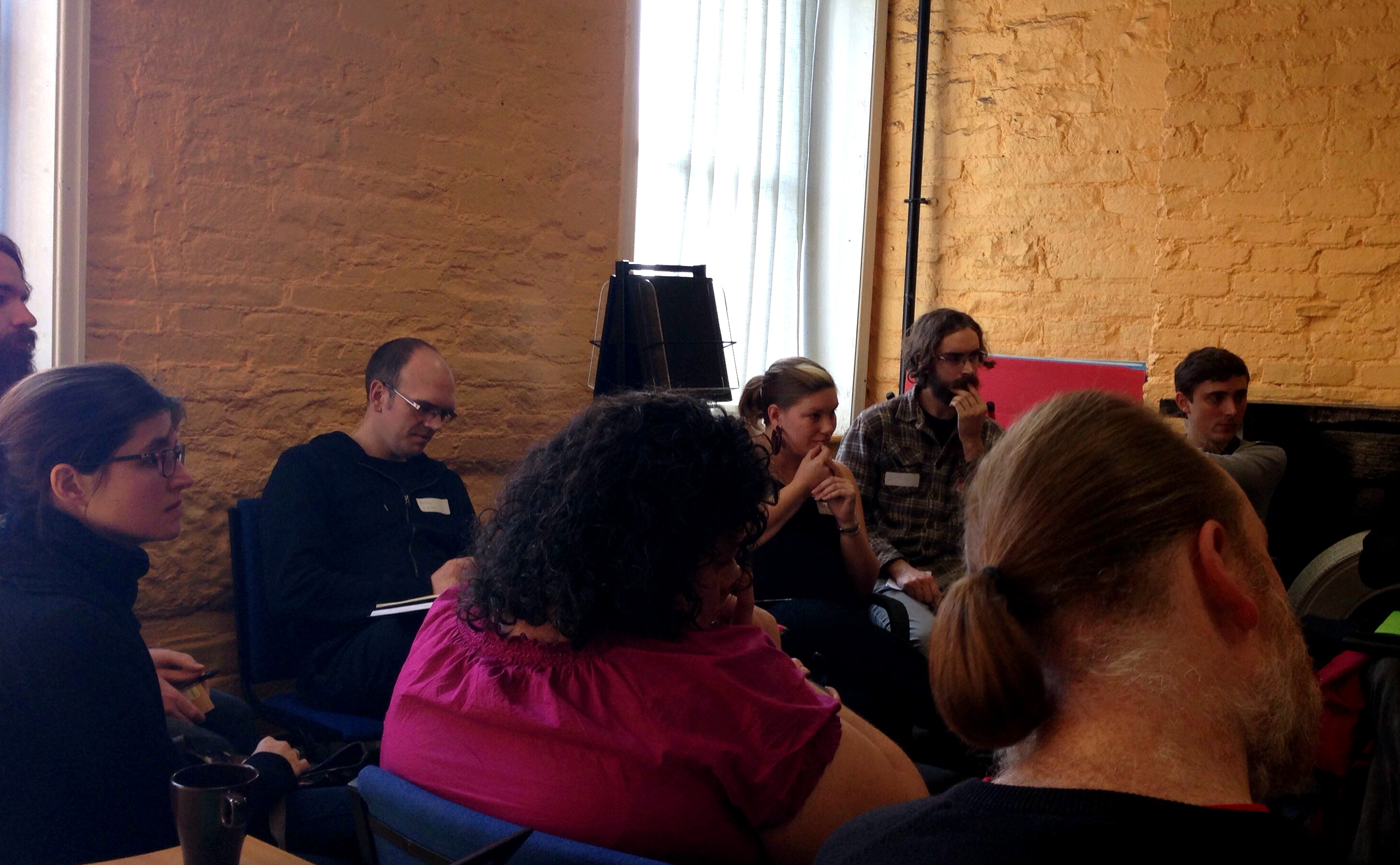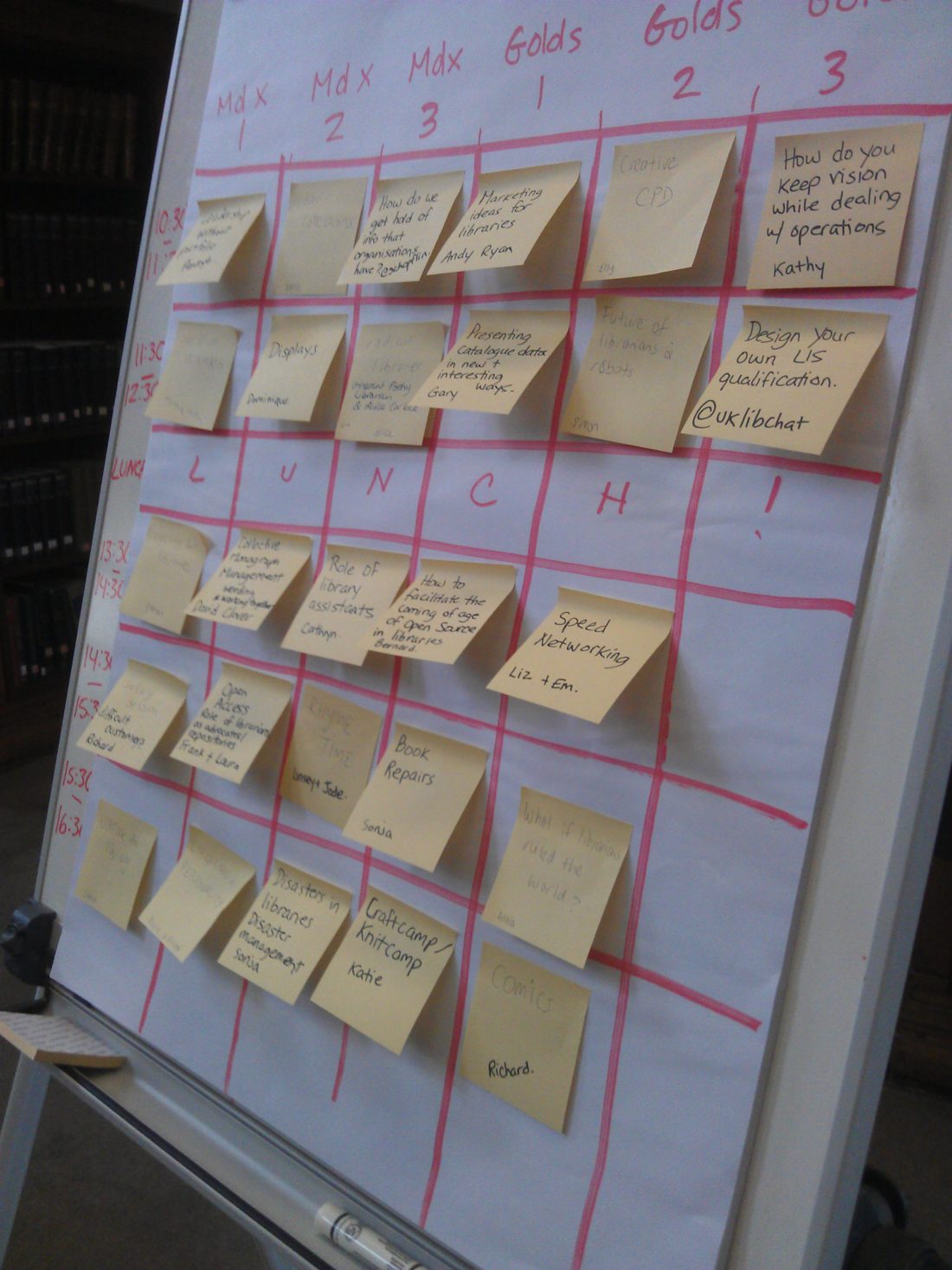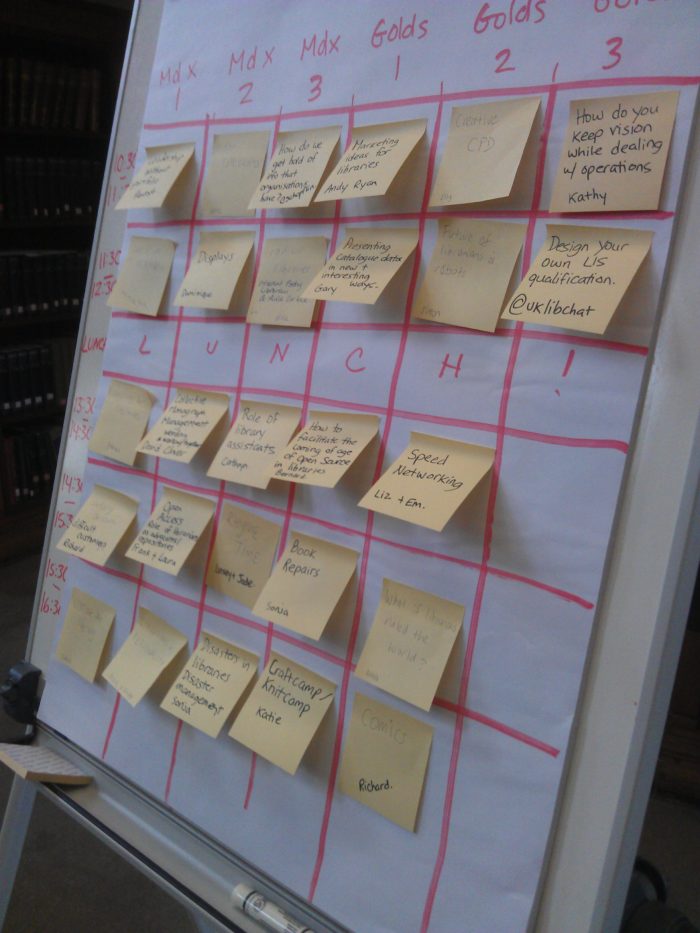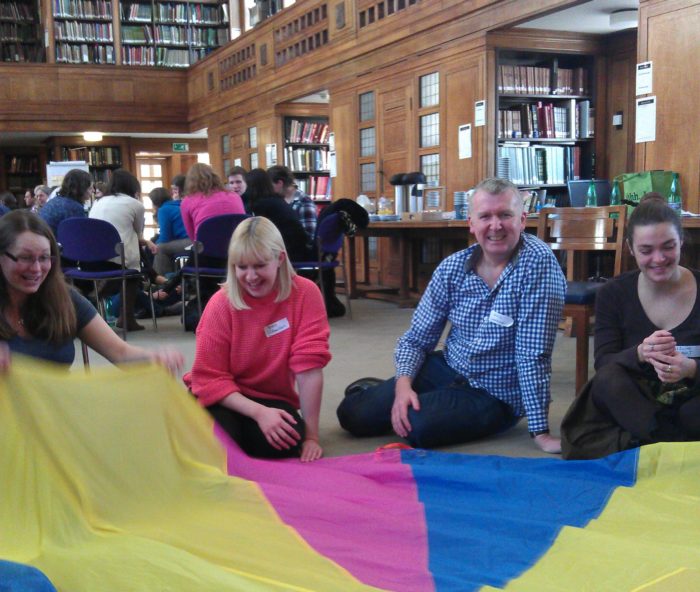Radical library camp
I recently attended, and helped to organize, a library unconference in Bradford. This was the first Radical Library Camp or #radlibcamp on Twitter.
There was some discussion pre-conference about the nature of a self-identified ‘radical’ unconference. I think the nature of unconferencing is already radical compared to formal conferences but what I thought made Radical Library Camp different was open space technology applied in a context of different issues and with knowledge of various issues and concepts already present with the attendees (or campers). In practical terms this meant sessions could hit the ground running with relatively little need to explain what we are about, and meant we could immediately dig into the issues at hand.
To me Radical Library Camp definitely still felt like a Library Camp event and ran along similar lines. It all went off very well. The venue, Bradford Resource Centre, was particularly welcoming and hosted us perfectly so many thanks to them.
For the event I had decided to try to talk less and spend more time listening and thinking about others’ contributions. However I couldn’t resist pitching something as I had recently been thinking about management and leadership and whether there could ever be a workable ‘radical’ approach, so…
Management and leadership session

I had done some reading about this, mainly at the excellent Institute of Education library, but really I wanted to open the question to the group and see where discussion took us. To this end I posed some questions after a brief opener:
- Is there an approach to managing people in libraries that remains honest? And if you manage people how do you do it?
- Making the leap: if you move from a ‘clerical / technical’ role to a ‘management / professional’ role, what changes? Is this just about others’ perceptions?
- Is it possible to be ‘management’ without selling out? How do you handle this yourself?
I explained I had been thinking primarily about leadership, but that we could easily look at ‘radical’ in different contexts such as supervision, management, or leadership. I suggested looking more broadly to be inclusive, as often staff on lower grades have supervisory or management responsibility without perceiving themselves as ‘management’ but will face some of the same issues as senior managers.
Some brief definitions of the difference between these roles:
- The supervisor’s job is directing and instructing
- The manager’s job is to planning, organizing, and coordinating
- The leader’s job is inspiring and and motivating
It seems much easier to pitch a radical approach to leadership than to management. It’s much easier to bring to mind approaches exemplified by leaders, for example in trade unions or politics, who take a bona fide ‘radical’ approach. The managing and supervising context is more difficult and on reflection I do not think we were able to develop answers much beyond a leadership context.
It can seem obvious or self-evident that libraries like other organizations need management to ensure they are efficiently organized and productive. Daniel Wren for example presents management as a quite natural thing that follows the evolution of human society:
As people’s conceptual ability has been refined through evolution, they have also refined their understanding of the art of arranging physical and human resource for guidance towards purposeful ends. We call this art management… (Wren, 1987 p. 11, italics in original)
From a very different angle Marx (1976 pp. 448-451) identifies managers and supervisors as ‘a special kind of wage labourer’ with a function made necessary by the need to maximize generation of surplus value and hence profit. Marx of course relates this function to class struggle and casts management as a function necessary to make wage labourers cooperate with each other under capital.
I also gave some context about new public management (NPM) from the contemporary public sector. NPM as a concept denotes broad government policies since the 1980s that aimed to make the public sector more efficient and effective, the idea being a market-oriented management style could be used to drive cost-efficiency for government. For the organization and workers this meant a shift from a bureaucratic approach based on state administration to a managerialist approach based on performance: from ‘state-regulated’ to ‘market-regulated’ (Ward, 2012 pp. 47-52).
Discussion
Personally I took two major themes or points from the session: if there is a radical approach to management and leadership it is based on both fairness as a manager and authenticity as a leader.
#radlibcamp radical management – being in a managerial position to create a positive change
— Dave Pattern (@daveyp) September 28, 2013
Several in the group raised the idea of changing things from the inside as a manager – the idea is similar to entryism in politics and was called such by one of the campers. This deserves credit as leaders are likely best placed with opportunity, power, and freedom to act to make improvements, and certainly to lead by example. One possible trap here would be overemphasising the role of the individual and thinking it’s down to the ‘heroic leader’ doing everything themselves that drives improvements.
A general point made was that we should seek good practice in management and leadership even if this isn’t ‘radical’, indeed much of it won’t be so. Examples given were communicating well, listening even if you cannot act on everything you hear, and involving staff to get input on decision-making. One point raised in the session and beforehand by Sarah on Twitter was that good management practice isn’t linked to left or right-wing political opinions.
Authenticity and fairness
Liz raised authenticity in leadership as a vital characteristic. This is about being authentic yourself as a leader, and also how you implement an authentic approach in your context as a manager. Goffee and Jones describe how leaders translate this into behaviour to demonstrate authenticity:
- A consistency between words and deeds – the leader practises what she preaches
- Presentation of a consistent ‘real self’, despite the need to play different roles to different audiences
- A sense of the leader being comfortable with her origins
These bullets are a paraphrased summary from Goffee and Jones (2006 pp. 16-17).
It doesn’t follow that the authentic leader is one everyone always agrees with or who is universally liked by staff, and the point was reinforced in discussion that it’s not possible to please everyone all the time.
Liz also raised the issue of being fair and being seen to be fair as a manager in treatment of staff as important. This means for example dealing with issues in a way that gives fair treatment to all and not playing favourites. To make one distinction here I would emphasize a difference between fairness and justice. The outcome of a situation may not be considered subjectively fair by everyone concerned, but from a management point of view it had better be just.
For me there was an outstanding question about personal responsibility and ensuring our personal values and professional ethics are congruent with our work and the values of the organizations we work for. One tweet commenting on the session discussion in this spirit from Dave:
#radlibcamp importance of “authentic management” – be prepared to resign if necessary
— Dave Pattern (@daveyp) September 28, 2013
One point raised from the audience here was this is a very difficult proposition for those in a situation of precarious labour. An example given was you may find you have no real choice but to work in an organization that doesn’t match your own ideals or professional ethics because there are no other jobs to move to. Points of principle rub up against real-world responsibilities like paying the rent or mortgage.
Stepping back from this very immediate example, more broadly from the point of view of managers and staff there is an issue here about the limits on what we can do personally to affect change. For example perhaps we dislike hierarchy, but we work in organizations that represent classic Weberian bureaucracies which rely on hierarchy to get things done. There is a balance here between going too far and selling out and being ineffective due to failing to engage with the cultural norms of the organization.
Reflecting on this further I think the key issue in authentic leadership is knowing where and how much to compromise to create progress without undermining our personal morals and professional ethics.
References
Goffee, R. and Jones, G. (2006) Why should anyone be led by you? Boston, MA: Harvard Business School.
Marx, K. (1976) Capital: a critique of political economy. Volume 1. Harmondsworth: Penguin.
Ward, S.C. (2012) Neoliberalism and the global restructuring of knowledge and education. London: Routledge.
Weber, M. (1947) The theory of social and economic organization. New York, NY: Free Press.
Wren, D.A. (1987) The evolution of management thought. 3rd edn. New York, NY: John Wiley.




